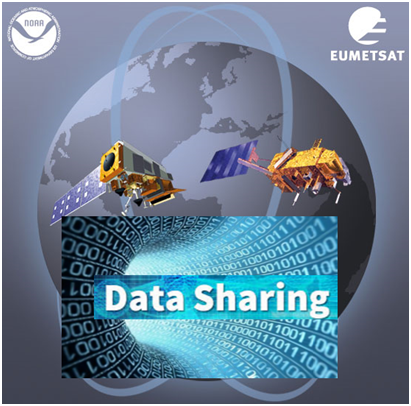Sharing the data: the information policies of NOAA and EUMETSAT

Sharing the data: The information policies of NOAA and EUMETSAT’ is an article published in March 2016 issue of IFLA Journal. The paper examines the data policies of NOAA and EUMETSAT organizations. The research illustrates how the mutual exchange of data, instruments, and grounds operations can improve efficiency and benefit user communities.
 The National Oceanic and Atmospheric Administration (NOAA) is an American scientific agency within the United States Department of Commerce focused on the conditions of the oceans and the atmosphere.
The National Oceanic and Atmospheric Administration (NOAA) is an American scientific agency within the United States Department of Commerce focused on the conditions of the oceans and the atmosphere.
The European Organization for the Exploitation of Meteorological Satellites (EUMETSAT) is an intergovernmental organization supplying weather and climate-related satellite data, images and products to the National Meteorological Services and Cooperating States in Europe, and other users worldwide.
NOAA and EUMETSAT work together in three different fields: geostationary satellites, polar-orbiting satellites, and ocean altimetry satellites. Each of these programs generate different data, thus rendering the NOAA and EUMETSAT capable of performing global observations that meet the requirements of their respective missions. To understand the elements of the system, the way they interact, and how they have changed with time, it is necessary to collect and analyze data. The US adheres to a free and open policy where data is made freely available without restriction or fee. NOAA and other scientific communities have long recognized the value of open data (see: Open Data Impact. NOAA Open Data Portal) and its importance in advancing research. In 2013 NOAA produced the Plan for Increasing Public Access to Research Results, which further proved commitment to open information exchange and long-term access. The European model, on the other hand, restricts the use of data for commercial purposes, charging clients who wish to reuse information. The paper examines the data policies (NOAA’s Data Policy, EUMETSAT Data Policy, and other key policy documents) of the two organizations in the context of an agreement established by the World Meteorological Organization (WMO) of the United Nations - in particular Resolution 40 - that defines the ‘essential’ and ‘unnecessary’ meteorological data requirements, that meet both the US and European requirements, which are traditionally at great odds. One of WMO’s main roles is facilitating the free and unrestricted exchange of data and meteorological information between member states that often have conflicting data-sharing policies. As weather, climate and the water cycle know no national boundaries, international cooperation at a global scale is essential for the development of meteorology and operational hydrology as well as to reap the benefits from their application (WMO in brief).
In particular, the paper analyzes the EUMETSAT-NOAA Collaboration in Meteorology from Space through key data policies with parallel-focusing on agency websites, circulars, technical literature, treaties, manuals, guides, summaries of programs, reports and agreements (that have helped shape the information infrastructure of meteorology) generated by respective data centers (EUMETSAT Data Centre, NOAA National Centers).
By summarizing the joint programs and data policies, this case study proves that both parties (NOAA and EUMETSAT) met their goals through collaborative initiatives based on compromise and the willingness to co-act in the . The data that each agency collects is not duplicated but is instead complementary.
The research illustrates how - despite differences in policy, industrial standards, technologies, jurisdictional and national boundaries - resource-pooling initiatives can improve efficiency and benefit user communities. Through the mutual exchange of data, instruments, and grounds operations, NOAA and EUMETSAT have established a long-standing partnership that has strengthened the weather community and overall information infrastructure of meteorology.
In an increasingly global information community, the NOAA-EUMETSAT partnership is a valuable example (not just for meteorologists!) of how (foreign) information communities can collaborate to create healthy information infrastructures that better serve their user communities and encourage research and reuse of data.
Source: Sharing the data. The information policies of NOAA and EUMETSAT (IFLA Journal, Volume 42, No.1, 2016).
Call for Papers: IFLA Journal special issue on Research Data Services (Submission Deadline: 16 May 2016)
The quality of Knowledge and Data Sharing depends on performance and continues improvement of access to data.
Are you aware of any issue and/or recent development (also in Agriculture, Forestry, Fisheries and Food sectors) proving this statement?
How could data-sharing policies encourage or discourage access, reuse, and preservation?
We would be interested to hear from you here!

